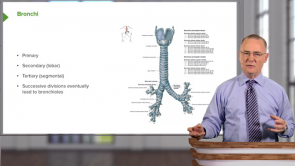Inguinal Canal – Abdominal Walls and Inguinal Canal

Über den Vortrag
Der Vortrag „Inguinal Canal – Abdominal Walls and Inguinal Canal“ von Craig Canby, PhD ist Bestandteil des Kurses „Anterior Abdominal Wall II (Texas A&M MGA Week 6)“.
Quiz zum Vortrag
Which structures are boundaries of the inguinal triangle? Select all that apply.
- Rectus abdominis muscle
- Transversus abdominis muscle
- Inguinal ligament
- Inferior epigastric vessels
- Internal oblique muscle
Which muscle aponeurosis forms an inguinal ligament?
- External oblique muscle
- Internal oblique muscle
- Transversus abdominis muscle
- Rectus muscles
- Iliopsoas muscle
What is the major structure that passes through the inguinal canal in men?
- Spermatic cord
- Round ligament
- Broad ligament
- Lymphatics
- Femoral artery
Which muscles contribute to the formation of the conjoint tendon? Select all that apply.
- Internal oblique muscle
- External oblique muscle
- Rectus muscle
- Transversus abdominus muscle
What forms the medial boundary of the triangle of Hesselbach?
- Lateral border of the rectus sheath
- Superior epigastric vessels
- Medial border of the rectus sheath
- Femoral artery
- Inferior epigastric vessels
Which hernia passes medial to the inferior epigastric vessels?
- Direct inguinal hernia
- Indirect inguinal hernia
- Femoral hernia
- Umbilical hernia
- Supraumbilical hernia
Kundenrezensionen
4,0 von 5 Sternen
| 5 Sterne |
|
0 |
| 4 Sterne |
|
1 |
| 3 Sterne |
|
0 |
| 2 Sterne |
|
0 |
| 1 Stern |
|
0 |
good lecture- lost a star because illustrations are in latin. I do appreciate latin is completely acceptable to use in the context of anatomy, but in practice nobody uses latin terms and it feels outdated and counter-productive to learn the latin nomenclature. It would be much easier to follow if everything was in english ; a small point but it did slow me down when following this lecture.

![Anatomy [Archive]](https://assets-cdn1.lecturio.de/lecture_collection/image_medium/87992_1693919964.png)


